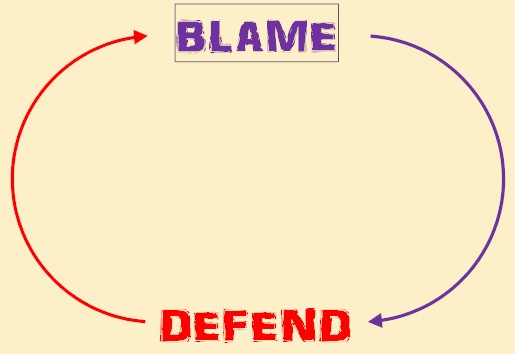Though I’m writing this on Christmas Eve Day, the same principle applies anytime. Holidays are especially given to conflict when family’s get together because we tend to easily punch each other’s buttons (they know our buttons because they installed them!). Now, to stop conflict dead in its tracks, we need to understand how it works. Of course, I mean ordinary conflict between individuals (I’m not trying to talk about the Middle East here). Basically, this diagram, if you can imagine it getting multiplied, explains a common cycle:

Bear in mind that this can be either IMAGINED or REAL, but for the cycle to work it must be PERCEIVED. Either way, someone feels blamed and defends herself, which then comes across as blame, which leads to the other person defending himself. Feel free to mix up the hims and hers in this example.
The game escalates until a final meltdown or someone walks off. Maybe they come back later and apologize, but what if you could just stop it when it’s happening?
What else contributes?
What to do makes sense once you know one more thing: SPLITTING
Splitting is also known as black-and-white thinking or all-or-nothing thinking, which simply means we can tend to decided that someone/something is 100% wrong or evil (or right or good). While it goes hand-in-hand with certain personality disorders, it is also something we can all do. Long term cultural and national conflicts use this tendency. Examples include, “All Jews/Blacks/Whites/Arabs/Mexicans/Americans/Rich/Poor/Republicans/Democrats are evil.”
While this is lame and irrational, it still can capture someone in the moment. If you are thinking the other person is 100% wrong, then you won’t have much of a path ahead except to ‘fix’ them as the evil source of blaming you, true?
What Do You Do?
The key is to snap out of the black-and-white thinking AND chill-out the sense of blame. Sounds easy, huh? ;-)Here’s what you do: SHOW A LITTLE RESPECT or APPRECIATION. When there is still respect/appreciation in play, then no one can really look at things in an all-or-nothing-you’re-blaming-me way. Here’s how you do it:
1. FIRST, tell the person something you appreciate related to the conversation (yes, you have to mean it!)2. SECOND, tell the person whatever else you want to say
I’ve found you can also mediate well in this manner. You describe what you appreciate in one person (and what you are concerned about / disagree with), then you repeat it for the other person. A professor of mine named Norman Geisler taught us to list what was ‘good’ about the other point of view BEFORE we gave our arguments against it. Great approach!
So, here is how it might sound.
“I appreciate that you are staying in the conversation and want to resolve it, but I’m frustrated that I can’t finish my thought without being interrupted.”
“I appreciate that you care so deeply for racial equality, but I don’t see how you are considering both sides of the debate.”
“I really respect your talent for debate as a means of understanding the issue, but it doesn’t seem you are open to someone sharing new information.”
Obviously you may need to run at this a few times, but you’ll find that if you FIRST keep sharing something you respect or appreciate related to the conflict of the moment, then things will most often calm down. Of course, with humans nothing works all the time! What this does tend to do is to get it out of the black-and-white-blame loop because you are reaching toward their heart with something good.
Off to learn,
Fred Ray Lybrand
P.S. This approach works even better if you and the other person can both agree to communicate with appreciation or respect before sharing the point of disagreement.